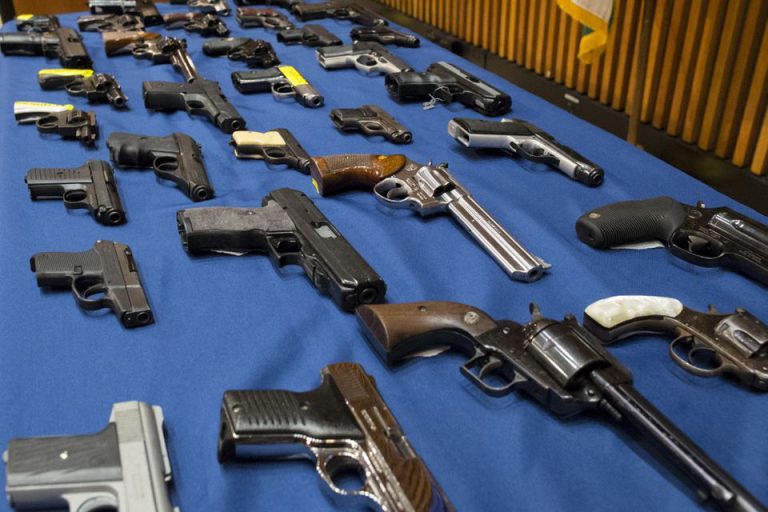
(Reuters) – New York lawmakers were voting on gun laws on Friday that would ban weapons from a long list of “sensitive places,” including Times Square, and require people who want a gun license to get more training and submit their social media accounts to government review.
The emergency legislative session began on Thursday, a week after the Supreme Court’s conservative majority struck down New York’s restrictive gun-license laws and ruled for the first time that the U.S. Constitution grants an individual the right to carry weapons in public for self-defense.New York’s Democratic leaders have lambasted the ruling, saying there will be more gun violence if there are more people carrying guns. They have conceded they must now loosen the state’s century-old permit scheme but are aiming to keep as many restrictions as they can in the name of public safety, which may end up a target for more legal challenges.
The court ruled the law legislators are changing gave too much discretion to officials to deny a permit.New York Governor Kathy Hochul, a Democrat who ordered the extraordinary session in the legislature, said the state’s gun-licensing regulations had resulted in New York having the fifth-lowest rate of gun deaths of the 50 U.S. states.
“Our state will continue to keep New Yorkers safe from harm, even despite this setback from the Supreme Court,” she said at a news conference in Albany. “They may think they can change our lives with the stroke of a pen, but we have pens, too.”The court allowed that people could be banned from carrying weapons in certain “sensitive places,” but warned lawmakers against applying the label too broadly. The court also made it easier for pro-gun groups to have a gun regulation overturned, ruling that a weapons regulation was likely unconstitutional if it was not similar to the sort of regulations around in the 18th century, when the Constitution’s Second Amendment was ratified.
In the early hours of Friday, the state government released the text of a bill that included a list of proposed sensitive places.
It included government buildings, medical facilities, places of worship, libraries, playgrounds, parks, zoos, schools, colleges, summer camps, addiction-support centers, homeless shelters, nursing homes, public transit including the New York City subway, places where alcohol or marijuana is consumed, museums, theaters, stadiums and other venues, polling places and Times Square.
The Senate passed the Concealed-Carry Improvement Bill 43-20 in a party-line vote on Friday afternoon after hours of debate in which Republican lawmakers said the new legislation was too onerous on people trying to exercise a right to carry guns. The Assembly had begun debate on the bill, but lawmakers said a vote may not be held before Saturday.
If passed, the law would take effect Sept. 1.
‘FLAGRANT VIOLATION’
The National Rifle Association, the powerful gun-owners’ rights group whose New York affiliate was the successful lead plaintiff in last week’s Supreme Court case, said the bill was a “flagrant violation” of the court’s ruling and created more barriers to New Yorkers’ self-defense rights, indicating it may soon face legal challenges.
“Gov. Hochul and her anti-Second Amendment allies in Albany have defied the United States Supreme Court with an intentionally malicious rewriting of New York’s concealed carry law,” Darin Hoens, the New York NRA state director, said in a statement.
The court ruled in New York State Rifle & Pistol Association v. Bruen that New York officials had too much subjective discretion over which gun-license applicants could enjoy what it said was a constitutional right. Applicants were denied a concealed-carry permit if they could not convince an official they had “proper cause,” or some kind of special reason, for carrying a handgun for self-defense.
Reluctantly and not without protest, Hochul agreed the state must remove the “proper cause” requirements, though the bill still requires licensing officers find the applicant is of “good moral character.”
The proposed new licensing rules also requires applicants to meet with the licensing officer, usually a judge or a police official, for an in-person interview, and provide the contact details of some immediate family members and any adults they live with.
The bill also makes it a felony to carry a gun into private business premises unless the business affirmatively posts a notice saying concealed weapons are welcome.






